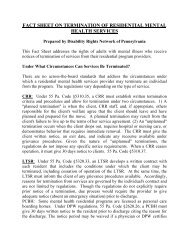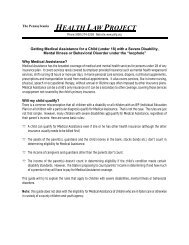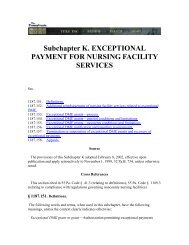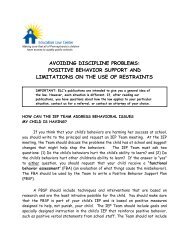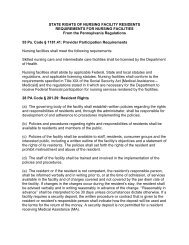Trauma is the Common Denominator, Healing is the Common Goal ...
Trauma is the Common Denominator, Healing is the Common Goal ...
Trauma is the Common Denominator, Healing is the Common Goal ...
- No tags were found...
You also want an ePaper? Increase the reach of your titles
YUMPU automatically turns print PDFs into web optimized ePapers that Google loves.
<strong>the</strong>ir recovery are well equipped to help o<strong>the</strong>rs face <strong>the</strong> same challenges. In fact, it’s been shownthat <strong>the</strong> shift from a passive victim to a proactive survivor offering leadership and support plays avaluable role in <strong>the</strong> peer-provider’s own relief from trauma. In addition, peer-counselors helpreduce <strong>the</strong> burden on <strong>the</strong> often undersized, overwhelmed professional staff. These peer-basedprograms emphasize outreach, focus on people’s strengths, avoid mental health labels, occur inlocal settings, offer social support, and are more culturally sensitive because <strong>the</strong>y are deliveredby people who are <strong>the</strong>mselves community members. Notable examples of successful peersupportprograms include Oklahoma City following <strong>the</strong> Murrah Building bombing, New YorkCity after 9/11, and Lou<strong>is</strong>iana in <strong>the</strong> wake of hurricanes Katrina and Rita. 39 Many states are stillin <strong>the</strong> early stages of developing a network of peer-support services in preparation for d<strong>is</strong>asters,and unfortunately, no peer response model currently ex<strong>is</strong>ts for those trauma victims in <strong>the</strong>criminal justice area.Resilience development <strong>is</strong> ano<strong>the</strong>r exciting, proactive innovation for <strong>the</strong> prevention as well astreatment of trauma. Denn<strong>is</strong> Charney, M.D., Ph.D., dean of research and professor of psychiatryat Mt. Sinai School of Medicine, believes that through focused training and cognitive behavioral<strong>the</strong>rapy, people can be inoculated against stress. “You can learn to recognize your own characterstrengths and engage <strong>the</strong>m to deal with difficult and stressful situations,” he notes. Charney andYale psychiatry professor Steven Southwick, M.D., identified personality traits associated withresilience in 250 American POWs held captive for up to eight years in <strong>the</strong> Vietnam War, whowere subjected to torture and solitary confinement. Then in two o<strong>the</strong>r studies, <strong>the</strong>y interviewedwomen who had suffered severe trauma from sexual and physical abuse, and a group of peoplewho d<strong>is</strong>played courage and resilience in <strong>the</strong> face of serious medical problems. All three groupsshared <strong>the</strong> same character<strong>is</strong>tics of resilience: optim<strong>is</strong>m, cognitive flexibility, altru<strong>is</strong>m, strong orheroic role models, adeptness at facing fears, physical fitness, a supportive social network, activecoping skills, a sense of humor, and a personal moral compass or shatterproof set of beliefs.Fostering those character<strong>is</strong>tics will help people deal with adversity when it occurs and recoverfaster from a traumatic event. 40<strong>Trauma</strong>-Informed Services — Solutions for <strong>the</strong> Growing Public Health Cr<strong>is</strong><strong>is</strong>Recent public d<strong>is</strong>asters, such as 9/11 and Hurricane Katrina, have provided a new sense ofurgency for <strong>the</strong> long-standing need for trauma education and awareness-building among allorganizations, institutions, and agencies that come into contact with survivors of violent events.When a program moves toward becoming trauma-informed, every part of its organization,management, and service delivery system <strong>is</strong> assessed and potentially modified to include a basicknowledge of how trauma impacts <strong>the</strong> life of <strong>the</strong> individual seeking help. <strong>Trauma</strong>-informedsystems are based on an understanding of <strong>the</strong> vulnerabilities or triggers of trauma survivors thattraditional approaches may actually aggravate or intensify, making th<strong>is</strong> new generation ofprograms more supportive and less likely to re-traumatize <strong>the</strong> victim.Th<strong>is</strong> <strong>is</strong> necessary to promote <strong>the</strong> health and wellbeing of survivors and <strong>the</strong>ir families, and to set<strong>the</strong> stage for health and mental health professionals, organizations providing services to traumasurvivors, law enforcement and criminal justice officials, emergency responders, and o<strong>the</strong>rs toeffectively and seamlessly integrate trauma understanding into <strong>the</strong>ir ex<strong>is</strong>ting programs andprocedures.P.O. Box 2516, Rockville, MD 20847-2516 ● p: 301-846-9110 ● info@witnessjustice.org ● www.witnessjustice.org



